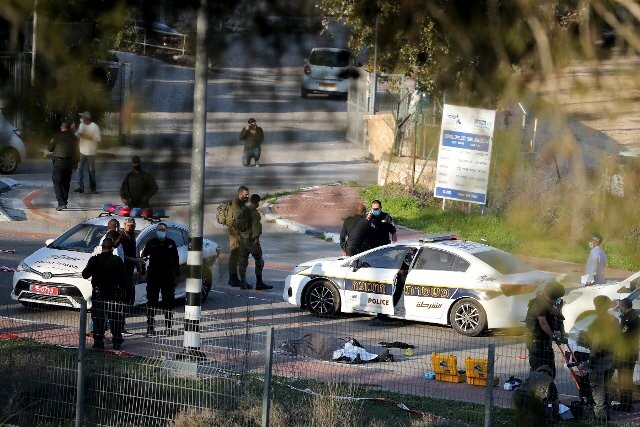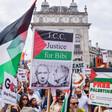Rights and Accountability 26 January 2021

Ahed Quqas, 25, was executed by a settlement guard at a West Bank junction on 5 January.
ReutersMore than 3,600 Palestinians have been killed by Israeli occupation forces, and a further 100,000 injured, since 2009, the year the International Criminal Court initiated its first preliminary examination of the situation in Palestine.
Ahed Qawqas Ikhleil, 25, was the first direct fatality of the occupation this year after being shot in the head by a settlement guard in the presence of Israeli soldiers on 5 January.
The Israeli military claimed that a “security coordinator” next to a settlement road junction in the West Bank noticed “a suspect approaching.”
The military said the “security coordinator” and a soldier who was with him “carried out the suspect-arrest procedure, including shooting in the air, during which the suspect threw a knife.”
At that point, the “security coordinator” of the Etzion settlement bloc executed Ikhleil.
As Gideon Levy reported in the Tel Aviv daily Haaretz, no security camera footage was released showing Ikhleil throwing a knife.
The military is usually quick to make public such documentation when it thinks it serves its narrative.
The military only released a photo of a knife which, as Levy states, “attests to nothing.”
Ikhleil had only days earlier opened up a sweets shop in his hometown of Beit Ommar, near Hebron, after years of apprenticeship in Ramallah.
Israel has detained the young man’s body, preventing his family from holding a burial or conducting an autopsy.
Settlements and the violence of colonization
Ikhleil was killed near a settlement road junction. The infrastructure of Israel’s occupation and settlement colony enterprise is a flashpoint of deadly violence directed at Palestinians.
His death exemplifies the permissive use of force by Israeli soldiers and settlement guards.
Vigilante settlers also play a key role in creating a coercive environment to push Palestinians off of their land.
Palestinian human rights groups say that the “intensifying” occupation demands immediate action by the International Criminal Court.
The urgency is “further necessitated by the intensifying support by the US” for Israel’s settlement-building and intentions to formally annex occupied territory.
Just over a year ago, Fatou Bensouda, the chief prosecutor of the International Criminal Court, stated that criteria for war crimes investigations in the occupied West Bank and Gaza Strip had been met.
She pointed to Israel’s illegal transfer of its civilian population into West Bank settlements as an example of a potential war crimes case arising from an investigation in Palestine.
Despite the illegality of Israel’s settlements being an “open and shut case,” in the words of UN special rapporteur Michael Lynk, Bensouda has not yet opened an investigation, though it is in her power to do so.
Instead, she asked for a ruling on court jurisdiction, punting the Palestine situation to a panel of judges, where it is currently in limbo.
The interminable pace of court proceedings hardly matches the urgency of the situation on the ground.
This month, Israel approved plans to build nearly 3,000 additional settlement housing units in the West Bank, including East Jerusalem.
As noted by the UN’s new Middle East peace envoy, Tor Wennesland, in his first briefing to the Security Council this week, “Of the units advanced and tendered, the majority are in settlements in outlying locations, deep inside the occupied West Bank.”
He added that more than 200 of those units “are located in illegal outposts that Israeli authorities are retroactively regularizing under Israeli law.”
Meanwhile, violence against Palestinians by its vigilante settlers is on the rise.
The Israeli group Yesh Din has confirmed dozens of incidents in which settlers attacked Palestinians in the West Bank over the past month.
Those attacks included settlers blocking main junctions on the principal highway in the West Bank and throwing stones at Palestinian vehicles.
In other cases, as Levy reported in Haaretz, “settlers invaded Palestinian communities, throwing stones at people and houses and torching cars.”
Settlers also attacked Palestinian farmers working their land.
Many of these incidents have been recorded on video or documented in photos. That documentation shows that soldiers passively stood by and did nothing to stop the violence.
Soldiers have testified to Breaking the Silence, a group of Israeli veterans critical of the occupation, that they were not authorized to arrest or detain settlers.Tandem violence
While at times appearing adversarial, the military and settlers colonize Palestinian land in tandem.
In December, Israel’s Civil Administration, a military body, told two Nablus-area villages in the northern West Bank that their land was now classified as residential, rather than agricultural.
The new classification allows Israel to expropriate the land to expand nearby Yitzhar settlement and open roads to serve the settlers living there.
The settlers of Yitzhar are among the most violent in the West Bank, frequently attacking Palestinians as well as their livestock, orchards, homes and vehicles.
As the Palestinian human rights group Al-Haq notes, “these attacks happen under the watchful eye” of the Israeli military, “if not actively encouraged by them.”
Isaac Levy, the guard of Yitzhar settlement, “is particularly infamous for his role” in violence against nearby Palestinian villages, Al-Haq states. He even gives orders to Israeli soldiers during those attacks.
The rights group documented 68 incidents of settler violence against Palestinians and their property in the West Bank between July and October 2020.
In many of those cases, Israeli soldiers failed to stop the settlers and instead used force against their Palestinian victims.
Under the guard of the military, settlers use violence to prevent Palestinians from working their land.
In one incident during September, Palestinians peacefully assembled in Asira al-Qibliya, south of Nablus, to plant olive trees. They were met by dozens of Israeli settlers and soldiers.
The military used tear gas canisters and sound bombs to forcefully disperse the tree planters, setting the land on fire. Settlers meanwhile assaulted Palestinians, including a journalist covering the event, with stones and sticks, Al-Haq recounts.
The violence only increased during the olive harvest that begins in October.
Settlers from Yitzhar, backed by soldiers, attacked a solidarity event on the first day of the harvest near Huwwara village, south of Nablus.
Soldiers told Palestinians to leave their land rather than asking the settlers to stop throwing stones at farmers, some of whom had to be hospitalized for their injuries.
Al-Haq states that settler attacks “are a direct result of the transfer of Israeli civilians into occupied territory,” a violation of the Fourth Geneva Convention and thus a war crime.
“The scale and frequency of settler violence has created a coercive environment” for Palestinians “which may result in their forcible transfer,” Al-Haq adds.
Forcible transfer is also a war crime.
But that matters little to Israel, so long as it pays no price for violating Palestinian rights, including the right to life and the right to self-determination.
As Palestinian human rights groups told the foot-dragging International Criminal Court last month:
“Abandoned by the international community, unable to access any Israeli, foreign or international tribunal, and subjected to a cruel occupation, the fate of the Palestinian people is now more than ever tied to that of the ICC.”
This article was edited after publication to correct Ahed Qawqas Ikhleil’s name.






Comments
ICC
Permalink Sean Breathnach replied on
Someone once said, “Israel has hypnotised the world” well it certainly looks like they have hypnotised the ICC.